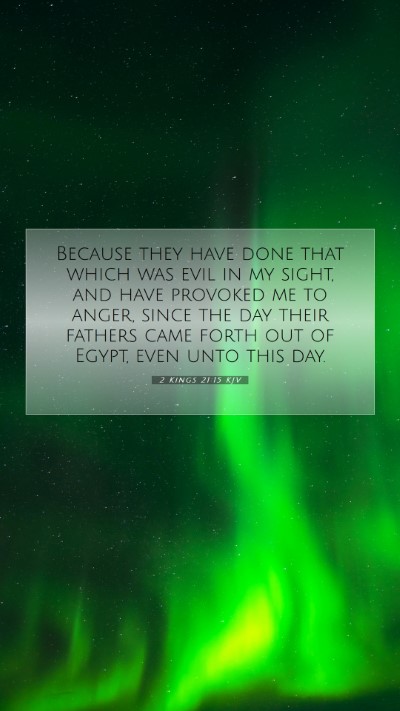Understanding 2 Kings 21:15
Bible Verse: 2 Kings 21:15
“Because they have done that which was evil in my sight, and have provoked me to anger since the day their fathers came forth out of Egypt, even unto this day.”
The verse highlights God's frustration and anger towards the people of Israel due to their persistent evil actions and disobedience. Below are insights and interpretations from various public domain commentaries.
Bible Verse Meaning
This verse serves as a key indicator of the ongoing rebellion of Israel against God, and it is essential to examine its layers of meaning. The following commentaries provide a rich analysis:
-
Matthew Henry's Commentary:
Henry discusses the context in which this verse appears, noting that God expresses His displeasure about the idolatry and wickedness that has afflicted Israel since their liberation from Egypt. He emphasizes the covenant that Israel had with God and how they repeatedly broke it, provoking divine wrath. Henry portrays this anger as a natural consequence of transgressions, indicating that their actions had long-term implications on their relationship with God.
-
Albert Barnes' Notes:
Barnes expands on the historical context, elaborating on the spiritual decline that took place over generations. He highlights the continuity of sin in Israel as a rejection of God’s commands. Barnes suggests that this verse reflects the accumulated guilt of the nation for its long-term unfaithfulness, thus marking a pivotal moment of accountability that cannot be overlooked.
-
Adam Clarke's Commentary:
Clarke emphasizes the prophetic significance of this verse, linking it to the larger narrative of Israel's history. He underscores the repeated warnings given by God through prophets and leaders, stressing that the iniquity had reached a climax where judgment was inevitable. Clarke indicates that God's judgment is not arbitrary but is rooted in the consistent moral decline of the people.
Scripture Analysis
The verse reveals several critical themes relevant to broad Bible study interpretation:
- The Nature of Sin: The persistent sinfulness of Israel shows the depth of human disobedience.
- Divine Justice: God's anger serves as a declaration of His righteousness, highlighting the consequences of turning away from Him.
- Historical Context: Understanding the sins of past generations helps us grasp the cumulative effect of rebellion against God.
Application of 2 Kings 21:15
In applying the insights from this verse to modern life, we must consider the following:
- Self-Examination: Believers today are called to reflect on their actions and their implications concerning God's will.
- Importance of Repentance: The verse serves as a reminder of the necessity for repentance and returning to God.
- Understanding Consequences: Just as Israel faced consequences for their disobedience, individuals and communities must recognize the potential outcomes of their actions.
Cross References
To further understand the implications of this verse, consider these related scriptures:
- Deuteronomy 9:7: Reminds Israel of their repeated rebellions against God.
- Jeremiah 44:4-5: Warns against the dangers of idolatry and disobedience.
- Romans 1:18-32: Discusses the consequences of turning from God and engaging in sin.
Conclusion
2 Kings 21:15 stands as a sobering reminder of God's judgment against unrepentant sin. The commentary insights provide a deeper understanding of the historical and spiritual dynamics at play, making this verse significant not just in its own right, but as part of the broader biblical narrative.
Overall, this exploration of Bible verse meanings and interpretations aids in our Bible study insights and applications, ultimately enriching one's understanding of Scripture.


